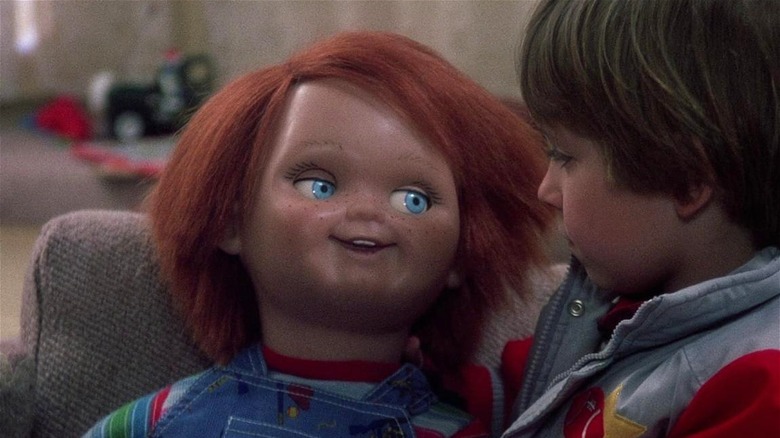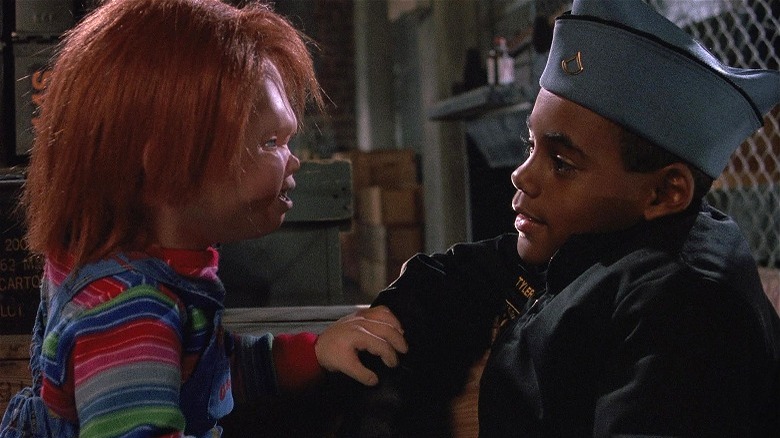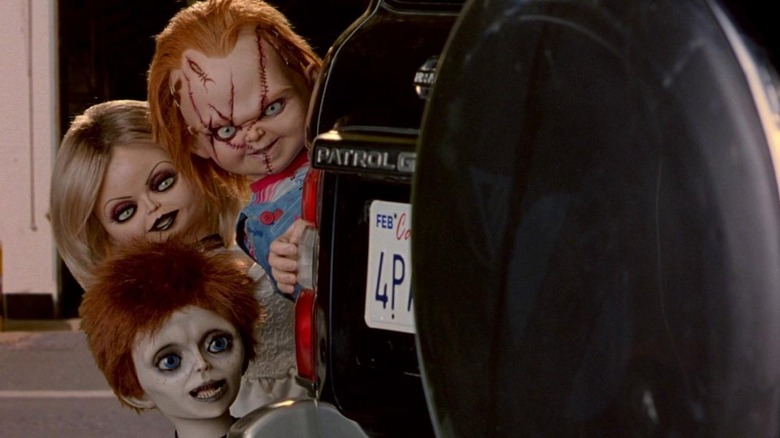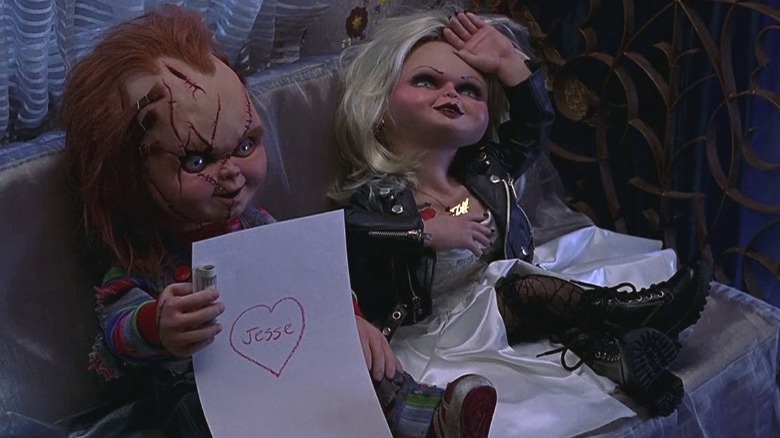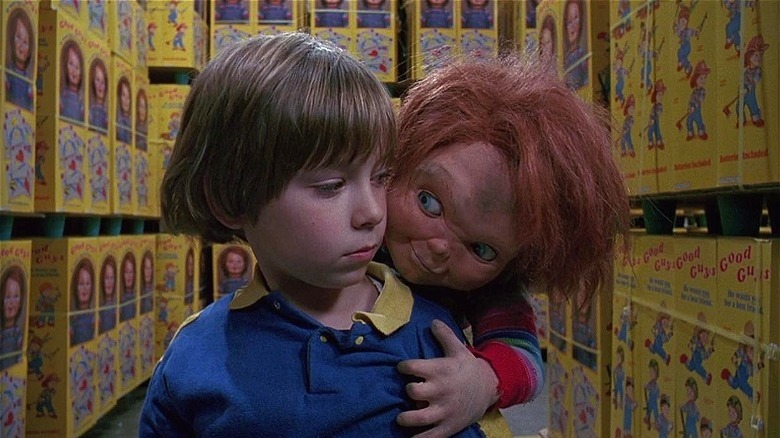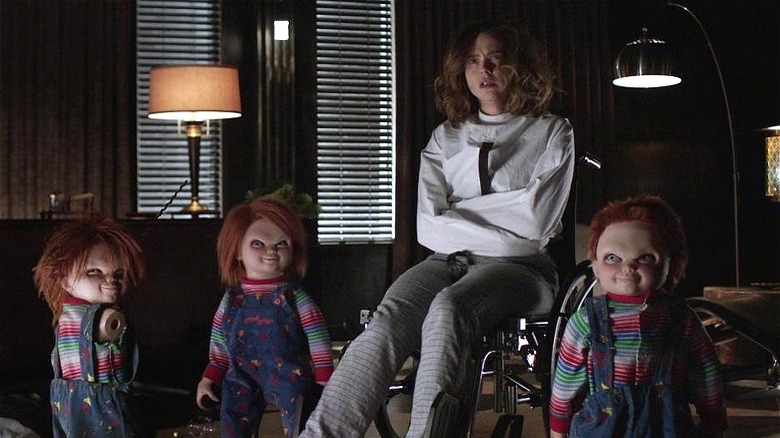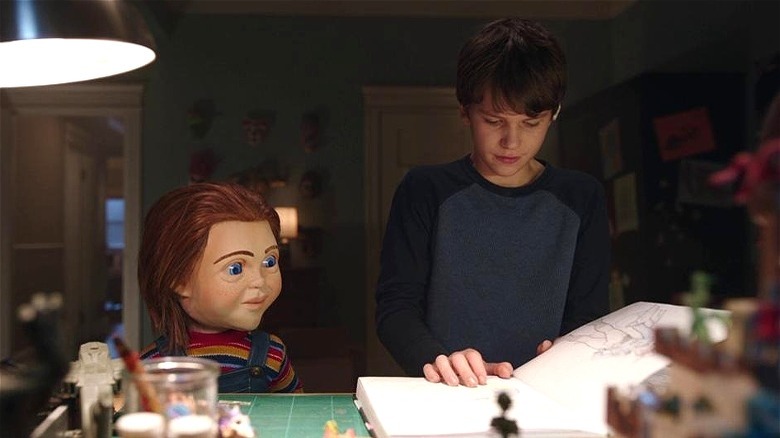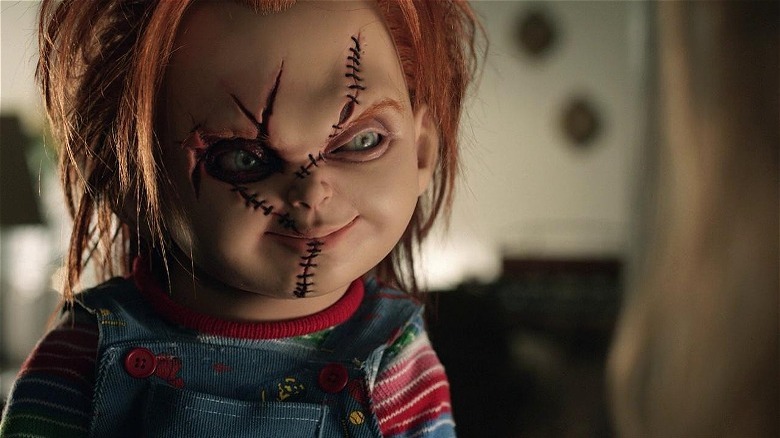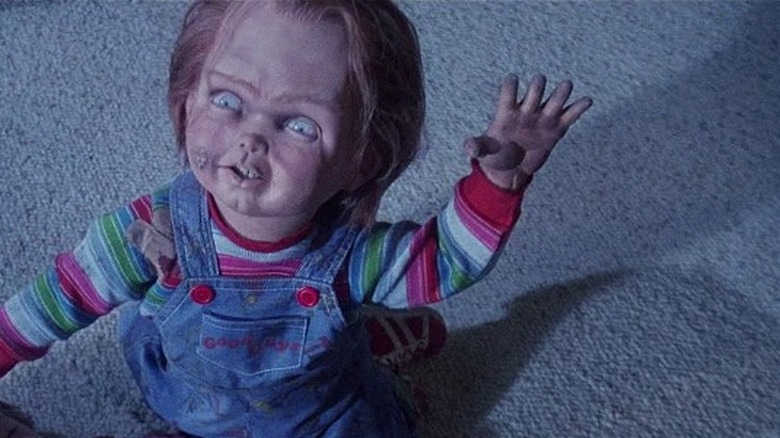Child's Play And Chucky Movies Ranked Worst To Best
What if a child's most trusted ally, a favorite toy, betrayed them? Something so perceptibly innocent and, well, not allegedly alive would be the last thing on Earth a child (or adult for that matter) would suspect of murderous intent. Inanimate objects have been the subject of hauntings for years, including demonic books like the Necronomicon in "The Evil Dead" or a static TV in "Poltergeist." But once the corruption of a child's toy entered the mix, the horror compounded simply from the sheer violation of innocence. The fear is far more palpable for the audience when the horror is seen through the eyes of a young child. Audiences desperately want the adults in the room to believe the ravings of a youngster who just witnessed something truly horrifying, but that sense of isolation burdens viewers with burgeoning anxiety and dread, building toward a shocking climax.
Don Mancini's creation, Chucky (voiced by Brad Dourif), did just that. Inspired by the killer Zuni doll in "Trilogy of Terror" and the "Living Doll" episode of "Twilight Zone," Mancini set out to make a feature-length film with modern animatronics to bring his horror subject to life. During the creative process, Mancini stated that he was "consciously influenced" by another horror icon, Freddy Krueger, who verbally tormented his victims with cruel humor and taunts. For all intents and purposes, Chucky was designed to have a soul that is completely antithetical to the idea of a children's toy — one who "spouted filth," as Mancini told Mental Floss. Little did he know at the time that his creation would endure for decades across eight films and a TV series.
The "Child's Play" franchise has left its mark on horror. Let's take a look at all of Chucky's morbid feature-film adventures, ranking them from worst to best.
8. Child's Play 3 (1991)
Rounding out a trilogy of films in 1991, "Child's Play 3" wasn't exactly Chucky's greatest moment. The story amounted to "more of the same" as Chucky (Brad Dourif), once again, tracks down Andy Barclay (Justin Whalin) — his obsession in the two prior films. Now a teenager, Andy is in military school and Chucky wants to complete their unfinished business. The film showcases a bit of corporate greed, as the toy company behind the Good Guy dolls seeks to capitalize off the toy several years later despite the bad press about the Barclay incident. The factory and assets are still in hand, it seems, and the toy strengthened the company's bottom line before the incident. So, to them, it was a no-brainer. Alas, Chucky was born again.
Instead of following through with the objective of transferring his soul into teenage Andy's body, Chucky realizes he has a new body and can once again possess the first person who learns his true nature. Therefore, he shifts focus to an 8-year-old cadet attending the same military school by the name of Ronald Tyler (Jeremy Sylvers). When Andy understands what's happening and sees the Good Guy doll, he does everything in his power to protect young Tyler from becoming Charles Lee Ray's host. Ultimately, Andy overpowers the serial killing doll, slicing him to bits. After seeing Chucky's prior "deaths," audiences never believed that his destruction here would keep the deranged killer down forever.
7. Seed of Chucky (2004)
Perhaps one of the films that took itself the least seriously, "Seed of Chucky" shows us that plastic dolls can conceive and bear children. In fact, in the final moments of "Bride of Chucky," we witness the little monstrosity making his ridiculously absurd entrance into the world.
Chucky and his former flame Tiffany (Jennifer Tilly) set out to start life as a family once they learn of their son Glen (Billy Boyd), who recently escaped an abusive master. Tiffany wants a normal family life, but Chucky can't resist the urge to maim and murder; he even wishes for his son to partake in the family business. Glen, however, isn't quite like his old man but is instead kind-hearted and benevolent. Because of this, Tiffany makes Chucky agree to stop killing. With his fingers crossed behind his back, Chucky shows us what we already know — a leopard never changes its spots.
In an astonishing turn of events, Glen is actually two beings. One is the timid Glen we've already known, and the other soul is of his ravenous sister Glenda (Ed Wood reference — nice!), who is more than happy to spill a little blood. When Glen sees what his sister has done while in control of his body, he is horrified. But it's honestly par for the course when both parents are murderers themselves. Glen is simply an anomaly.
Aside from voicing the devilish Tiffany doll, Tilly also portrays herself in the film as an actress. After Jennifer becomes pregnant with Chucky's child, the pregnancy speeds up at a rapid pace, thanks to the voodoo magic at work behind Chucky's entire being. In a rather fun coincidence, she bears twins: a boy and a girl. In the final moments of the film, we learn that Tiffany, Glen, and Glenda have all transferred their souls into Jennifer and her two infant children, while Chucky seemingly has an epiphany and decides he enjoys being an evil doll. In defense of his mother, Glen decapitates Chucky in his first truly violent act. But again, we know better — Chucky always returns.
6. Bride of Chucky (1998)
The precursor to "Seed of Chucky" began with the origination of Chucky and Tiffany as a doll-couple united in bloodshed. After Chucky's destruction at the end of "Child's Play 3," Tiffany (as a human) bribes and murders a police officer in order to obtain the pieces of Chucky's body and reassemble them. With the power of more voodoo incantations, Tiffany successfully revives Chucky's soul within the doll and then he proceeds to do what he does best — kill the first thing he sees, namely a lowly goth boy-toy seeking Tiffany's attention. Delighted to bring back her former love interest prior to his transference to a children's doll, Tiffany brings up an engagement ring that was found on his body thinking he'd propose. Not the romantic type, Chucky laughs off the idea of any proposal and states that the ring was simply something he stole.
Angered by his callous disregard for her love and loyalty, Tiffany traps him in a cage, but Chucky frees himself and electrocutes her while she's in a bathtub. He then places her soul in a bride doll she had in her possession. With her death, Chucky creates a new partner in crime as their motivations align: retrieve a new human body.
The film took a more humorous approach, focusing on black comedy instead of the frights and jump scares of the past "Child's Play" films. Whereas Andy was the lead character in the prior films, the narrative in "Bride of Chucky" is focused on Chucky himself as well as Tiffany. Their unsuspecting human prey Jade (Katherine Heigl) and Jesse (Nick Stabile) amount to supporting roles. While the movie stood squarely in the horror-comedy arena, it honored its horror roots with cool cameos of Freddy Kreuger's glove, Leatherface's chainsaw, the Jason Voorhees hockey mask, and Michael Myers' mask, all seen within police evidence lockup at the start of the film.
5. Child's Play 2 (1990)
The Play Pals Corporation never gives up on its product. They constantly seem to be attempting to salvage the Good Guy line, no matter how much bad PR they receive — and stabby deaths rarely make good public relations. In the second "Child's Play" film, the company reassembles the doll with tight quality control in an effort to show the public and, more importantly, the company's stockholders that no harm was done. One of the workers is electrocuted during this rebuild process, and the CEO forcefully tells his underlings to suppress the event. This company must have amazing Glassdoor ratings.
Poor little Andy (Alex Vincent) is forced to live in a foster home when his mother is institutionalized in a mental treatment facility after the horrific events in the first film. Of course, Chucky escapes following the company's bid to unknowingly resurrect a walking doll of death, and he quickly tracks down Andy. At this stage, Chucky still believes the rules of the voodoo magic are that he can only transfer his soul to the first person who discovers his true nature. The franchise obviously gets loosey-goosey with that rule later on.
For the sake of this film, Andy is still the target. While it's great that the poor kid is seeing a therapist, it's for all the wrong reasons. Chucky attempts to complete the ritual of transferring his soul to Andy, however, he realizes he is incapable of doing so, and angrily sets out to kill the little boy. Andy, with the help of his foster sister Kyle (Christine Elise), eventually gets the better of the evil doll.
"Child's Play 2" was considered a box office success and even took the top spot at the box office in its first weekend. Because of the success of the first two films, Chucky was officially solidified as a horror icon, with a bright future ahead.
4. Cult of Chucky (2017)
"Cult of Chucky" was the second of two direct-to-video films in the franchise following "Curse of Chucky." But despite any preconceptions general audiences may have had about direct-to-video releases, "Cult of Chucky" was a quality horror film.
Following "Seed of Chucky," the series shifted back into horror mode as Chucky once again became a threat always hiding in the shadows. Following the events of "Curse of Chucky," Andy Barclay — now an adult (and once again portrayed by Alex Vincent) — keeps the head of Chucky on a pike, taking pleasure in constantly torturing the crazed killer within the doll as retribution for his sins. What Andy doesn't know is that Chucky has found a way to split his soul among multiple dolls.
For the four years following the events of the previous film, Nica Pierce (Fiona Dourif) spent her days in a mental institution, convinced that a doll murdered her family. She has been convinced by her psychiatrist Dr. Foley (Michael Therriault) into believing that she committed the murders in an episode of psychosis and that her memories of Chucky were merely a way for her brain to cope. After the doctor introduces a Good Guy doll into his patient group to aid in the healing process, funny business begins all over again. Two more Good Guy dolls are eventually introduced to the facility and Chucky possesses all of them.
The idea of multiple Chuckys causing havoc and wreaking terror on the patients within the asylum offers unapologetic primal thrills, and brought the franchise into new territory. In an interview with Collider, Don Mancini stated, "I didn't really know how I would do it dramatically, but I just knew that the image of a bunch of Chuckys was cool. I felt that at this point in the franchise, it was time to do it. It was time to do something really new, to take it to another level."
The new direction worked, garnering largely positive reviews from critics.
3. Child's Play (2019)
In the age of reboots and remakes, "Child's Play" landed one of its own in 2019. The story revisited the Barclay family made famous by the original 1988 film, but the remake did away with the serial killer soul trapped in a doll's body trope and modernized the premise by examining A.I. technology gone awry. Instead of the Good Guy dolls, the company has now introduced the Buddi dolls; they look remarkably similar to the original Chucky doll but with added robotic elements. The Buddi doll acts as a smart hub that can control other Kaslan smart products in the home, and part of the doll's "Revolutionary technology" is that it is supposed to imprint on the child, learning its behaviors so they can play together.
The start of the film sees a disgruntled factory worker get fired. He ends his life, but before doing so, he sticks it to the company in a final act by unlocking the safety protocols around one of the dolls in the production line, allowing its A.I. to operate free of restriction. Ultimately, this results in chaos. At first, Chucky (Mark Hamill) seeks Andy's (Gabriel Bateman) approval, but he comes to believe he can best protect Andy through violent means. Eventually, Andy comes to realize that the doll has blood on his hands, and he has to figure out how to reign in the murderous robot. As one would expect, everything gets out of hand, and the final moments of the third act turn into a bloody nightmare.
Ultimately, the series creator was pushed aside for the reboot, and he voiced his frustration with the move to reboot the franchise. On the Post Mortem podcast, Don Mancini noted that he felt insulted by MGM's request to add him as an executive producer on the film, as he is still actively developing "Chucky" entertainment in both direct-to-video format and a TV show. The film performed moderately from a box-office perspective, but many loyal fans were turned off by the experience, leaving it unclear if a sequel will ever be pursued.
2. Curse of Chucky (2013)
Nearly a decade after the release of "Seed of Chucky," Don Mancini breathed new life into the serial-killing doll franchise with "Curse of Chucky." The film took the little slasher back to his horror roots by placing him in the home of a new unsuspecting family — this time the Pierces, recipients of a seemingly new Good Guy doll by mysterious means.
After receiving the doll, matriarch Sarah (Chantal Quesnelle) dies under strange circumstances, her death ultimately ruled as self-inflicted. Her paraplegic daughter Nica (Fiona Dourif, aka Brad Dourif's child) suspects the doll after doing her own research on Good Guy and their connection with serial killer Charles Lee Ray. Chucky soon makes himself known, and Nica does everything within her power to stop him. In typical Chucky fashion, however, the majority of the family bites the dust.
Before attempting to kill Nica, Chucky tells her the reason he came to her home and murdered her entire family. Prior to the events of the original film, Charles Lee Ray was infatuated with Nica's then-pregnant mother Sarah. Ray eventually kidnapped Sarah to have her for himself, and as police arrived on the scene, he stabbed her, causing the baby to be born a paraplegic. The police pursued Ray and cornered him in the toy store where he was shot and killed, but not before transferring his soul into a Chucky doll. All of this clever revisionism is meant to present the classic 1988 film in a new light and an expanded universe.
After a lengthy hiatus with the series, "Curse of Chucky" was met with mostly positive reviews. In an interview with Ain't It Cool News in 2008, Don Mancini was asked about the hesitancy of reboots and sequels within fandom and what that means for Chucky's future. "I think what we are mainly responding to, [producer] David [Kirschner] and I, is the will of the fans, which is really telling us that they want to see a scary Chucky movie again," he said. "They want to go back to the straightforward horror rather than the horror comedy."
Much of the success of the film was a result of Mancini simply listening to the die-hard fans, making its success particularly satisfying.
1. Child's Play
The horror all began in 1988 with the release of the original "Child's Play," whose enduring legacy is due in large part to its terrifying twist on horror — an evil child's toy transforming from a charming plaything to an unsettling murder machine. While the idea of a possessed doll wasn't entirely new, it also wasn't mainstream yet, either. After dedicating a feature-length film to the concept, audiences were shocked by the trash-talking, blood-lusting doll; a soul attempting to cheat death, but unable to resist its intrinsic urge to kill.
After murderer Charles Lee Ray meets his own demise at the hands of pursuing law enforcement, he grabs the nearest object, a Good Guy doll, and performs a voodoo spell, transferring his soul into its body before his own mortal flesh expires from its wounds. Of course, young Andy Barclay (Alex Vincent) is the unfortunate recipient of the corrupted doll. Chucky reveals himself to Andy, stopping at nothing to transfer his soul into the child's body while trying to kill anyone who gets in his way.
The film received high praise from renowned critics such as Roger Ebert, who stated that the film "is a cheerfully energetic horror film of the slam-bang school, but slicker and more clever than most." The movie also made big money at the box office (despite carrying a limiting R-rating), becoming one of the highest grossing films of 1988. "Child's Play" left an indelible mark on the horror genre — and all these decades later, we all know that Chucky will be back again, a true best friend 'til the end.
